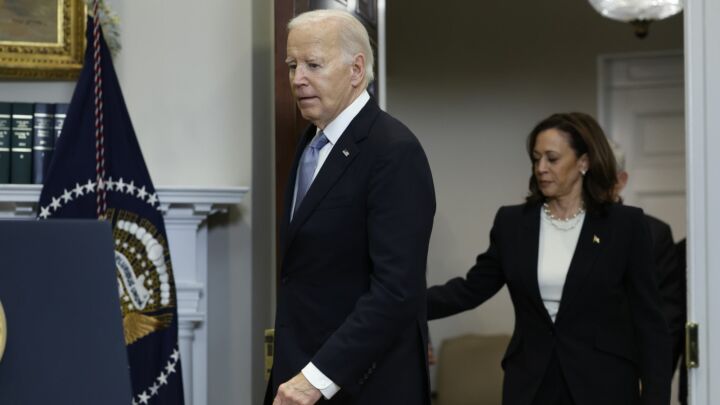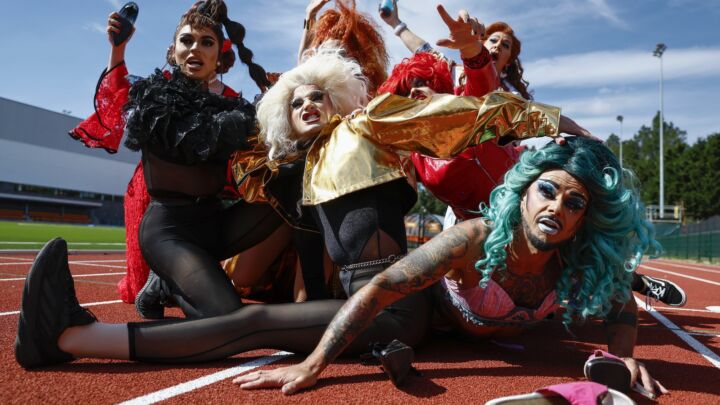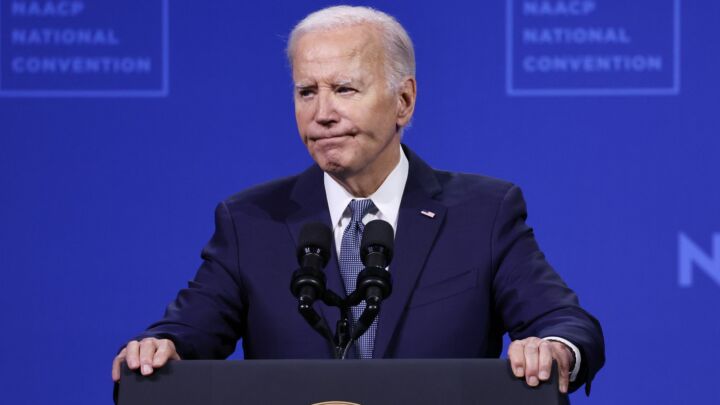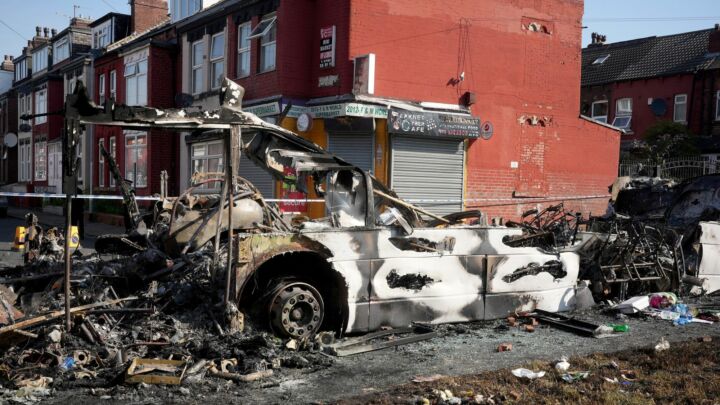The hapless von der Leyen shows the wisdom of Brexit
The unelected president has been forced on Europeans once again.

Want to read spiked ad-free? Become a spiked supporter.
Whenever I’m asked if I regret backing Brexit, I like to point to what’s going on in the institution we left.
Just look at how the useless Ursula von der Leyen has been foisted on a reluctant European public – again. Late last night, at a summit of European Union leaders, it was confirmed that she will continue as president of the European Commission. Meanwhile, former Portuguese prime minister António Costa will lead the European Council and Estonia’s Kaja Kallas will step down as her nation’s PM to become the EU’s foreign-policy chief.
The confirmation of these appointments is a stark reminder of the EU’s contempt for democracy. Its leaders, its policies and its laws are decided not by public consent, but by backroom talks and horsetrading, through processes that are deliberately labyrinthine and opaque, and impossible for the lay citizen to get his or her head around.
It was just two-and-a-half weeks ago when voters across the EU dealt a bloody nose to the Brussels establishment in the European Parliament elections. Populists, Eurosceptics and right-wing parties surged to new heights. Yet none of that matters when it comes to picking who runs the EU. The EU treaties say the results should be ‘taken into account’, but they are not the deciding factor.
Nor will any of the 182million votes cast in those elections have any bearing on the EU’s policies for the next five years. Those will be set out by the unelected European Commission, with von der Leyen at the helm. The so-called European Parliament, unlike any parliament in the democratic world, can neither initiate nor veto legislation – it can only accept, reject or amend it. Brussels really is a democracy-free zone.
This time around, the role of choosing the EU’s next leaders fell to just six negotiators. The 27 elected heads of EU member states then got to approve their choices yesterday, and the European Parliament will get to accept or reject them in July (MEPs are almost always too supine to kick up a fuss). The six negotiators were drawn from the three political groupings – the centre-right, the centre-left and the liberals – that held the balance of power in the European Parliament before the elections. The fact that populist and Eurosceptic parties made unprecedented gains, and that centrist moderates lost a huge amount of support, had no bearing on who was allowed to be in the negotiating room.
‘I don’t think citizens’ votes in EU elections are currently being considered in negotiations for EU top jobs’, said Italy’s right-populist prime minister, Georgia Meloni, on Wednesday. It was a statement of the obvious. Even the Europhile Politico magazine has conceded that this appointment process bears more resemblance to the cardinals of the Vatican selecting a pope than it does to any recognisably democratic system.
Certainly, a democracy would be highly unlikely to elevate Ursula von der Leyen to the top job, let alone reappoint her after such a disastrous five years in power.
When von der Leyen was first nominated for the presidency back in 2019, she was a singularly unimpressive candidate. Indeed, this was probably why she was selected. According to a Bloomberg report, when EU leaders picked her, they ‘deliberately eschewed candidates with greater experience, charisma or cunning’. She was seen as someone who could easily be pushed around, by both the European Council of member-state leaders and by the faceless Brussels bureaucracy.
Von der Leyen was best known back then as Germany’s defence minister – a role that cemented her reputation for incompetence and scandal. On her watch, the German military and its equipment became so degraded that, at one point, soldiers were forced to conduct military exercises with broomsticks instead of guns.
Her track record of failure turned her into one of Germany’s least-popular politicians. But with the help of then chancellor Angela Merkel, who pulled some strings in Brussels, she was allowed to fail upwards and was parachuted into the Commission presidency shortly after the 2019 EU elections.
Von der Leyen’s incompetence became impossible to ignore when she was hit with her first major challenge as the EU’s leader – the Covid pandemic of 2020 and 2021. As the emergency struck, member states mostly turned their backs on the EU and acted alone. The borderless and passportless Schengen Area celebrated its 25th anniversary at a time when 14 EU member states had reimposed national borders to keep out the virus. When von der Leyen did intervene in the pandemic, disaster followed. While she boasted of taking ‘personal charge’ of the EU’s vaccination programme, the rollout was infamously slow, lagging behind much of the rest of the world – and, most embarrassing of all for Brussels, behind Brexit Britain.
Von der Leyen has hardly fared much better in the aftermath of the pandemic. Over the past year or so, just about every EU member state has been rocked by furious farmers’ protests. The source of their anger is the EU’s Green Deal, which locks every member state into reaching Net Zero carbon emissions by 2050. Although it was hailed by von der Leyen as ‘Europe’s man on the Moon moment’ when launched in 2020, it soon became clear that its stringent emissions targets could destroy European agriculture. It called for drastic cuts in the use of pesticides and fertilisers, and for vast tracts of farmland to be set aside – an impossible task. When farmers began to park up their tractors in national capitals, bringing life to a standstill, von der Leyen was forced to water the targets down.
These irrational, burdensome eco-rules have played a huge role in the rise of populist parties. They also led to a rout for Europe’s Green parties in the recent EU elections. Yet now that those elections are out of the way, von der Leyen is reportedly considering reviving her hated climate policies to court the support of this dwindling Green rump. Whoever you vote for, no matter how furiously you protest, the Brussels ‘consensus’ lives on.
Leaving all this behind is what Brexit was all about. We rejected an EU that is dysfunctional and undemocratic, in which the elites rule without accountability or consent. Ursula von der Leyen’s hapless tenure reminds us of the tremendous wisdom of Leave voters.
Fraser Myers is deputy editor at spiked and host of the spiked podcast. Follow him on X: @FraserMyers.
Picture by: Getty.
To enquire about republishing spiked’s content, a right to reply or to request a correction, please contact the managing editor, Viv Regan.









Comments
Want to join the conversation?
Only spiked supporters and patrons, who donate regularly to us, can comment on our articles.